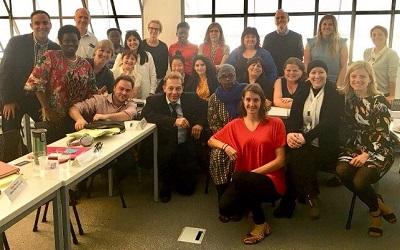You are here
- Home
- Year of Mygration
- Day 167, Year of #Mygration: OU Participation in UNHCRs Connected Learning in Crisis Consortium
Day 167, Year of #Mygration: OU Participation in UNHCRs Connected Learning in Crisis Consortium

Dr Koula Charitonos, a Lecturer in the Institute of Educational Technology at The Open University (OU), co-leads the OU’s engagement with the United Nations High Commissioner for Refugees' Connected Learning in Crisis Consortium (CLCC). Here, she updates us on the latest developments from the CLCC meeting held in Geneva from 22 -25 June 2018.
Earlier in the summer I headed to Geneva in Switzerland to take part in a panel discussion at the UNHCR and also represent the OU at the CLCC. This was my first time at one of these meetings so I was very excited about meeting colleagues from a range of institutions actively engaged in providing higher education in contexts of conflict, crisis and displacement. Also, about the prospect of discovering more about the role of the CLCC in a field that sees unprecedented numbers of people on the move and facing serious protection challenges for more than 65 million people.
I found the four days inspiring. They were divided into (1) a brown bag briefing panel at UNHCR followed by a meeting with the Director of the Division of Resilience and Solutions (DRS) and, (2) activities that were held at the InZone in the University of Geneva, which coordinates the CLCC alongside UNHCR Education.
To give some background information about the CLCC: the consortium was formally established in 2016 (through an inception grant from the Open Society Foundations) to unify innovative and digital higher education efforts and to focus, in particular, on addressing the needs of refugees and displaced communities. The numbers provided by UNHCR reflect the urgent need for action: of the 6.4 million refugees of primary and secondary school-going age, at least 3.5 million do not have access to education, for example. At primary level, at most, 61% of refugee children are enrolled in school compared to the 91% global average. The gap between refugee youth and global youth numbers attending secondary level education is even larger with 23% of refugees compared with 84% worldwide. Finally, less than 1% of refugee youth have access to tertiary education, compared to 36% of global youth. Given these alarming figures, the CLCC was set up to coordinate efforts on the provision of Higher Education in contexts of conflict, crisis and displacement through connected learning, while at the same time developing innovative good practice and quality standards for sustainable and potentially scalable solutions. Part of its mandate is also to raise awareness, to develop, share and disseminate evidence and to engage in advocacy. It further aims to develop and share pioneering pedagogical approaches for delivering technology-supported connected learning.
The brown bag briefing involved members of the CLCC such as the Arizona State University, Centreity, InZone, JWK, Kiron, WUSC and the Open University in a roundtable format. We shared insights from our work around the world and discussed ways in which our programmes are helping to support the aims of the Comprehensive Refugee Response Framework (CRFF), especially around broadening access to tertiary education for displaced learners. We discussed types of support that refugee students require and whether providing access to online programmes is sufficient to meet the needs of the communities we work with. Key issues that were identified in this discussion included: the recognition of prior learning with or without official documentation, formal academic credit corresponding to national/international frameworks and credit transfers but, also, financing access to higher education. Each member provided examples to highlight how programmes can be designed to promote flexibility to support enhanced pathways to solutions, an area that we at the OU, have a wealth of expertise to offer.
Following this, we had a meeting with Daniel Anders, the Director of DRS. The Resilience and Solutions division was recently created (February 2018) with the aim of strengthening the work on pathways to solutions and the role of education for refugees. The new Livelihood Unit within DRS is currently focusing on linkages between employment and tertiary education, while the Education Section is working on a new education strategy, which will include connected learning (due in Autumn 2018). During our meeting we focused on the types of support UNHCR can provide to us, such as bringing together different networks involving academics, civil society and policy makers as well as invest in research in refugee education for evidence-based activity and policy making. A key question that Daniel Anders asked us and our institutions to consider was – ‘what do we need to do in order to scale up and tackle the 1% of the refugee youth who currently have access to tertiary education’?
Over the next three days the consortium members had the opportunity to discuss their work in the field of refugee education. The programmes varied from “Learn English Now! In Zaatari Azraq camps” to “Borderless Higher Education”. These are two examples, but you can see the wide array of ongoing work in the CLCC 2017 Yearbook that has been just published. I presented the LASER project which is EU funded and delivered by the British Council in Jordan and Lebanon. It involves delivering face-to-face English and academic skills courses to refugees, as well as short online courses in partnership with the OU.
We had several sessions over the weekend, engaging in lively discussions and group exercises concerning issues such as employment and employability in relation to forced displacement, growth and the scale and impact of our work. We shared the challenges we face (e.g. funding, resources, connectivity), how to get to know the right collaborators, the ethical dimensions of working with refugees, what pedagogic approaches to use as well as how to engage refugees in our discussions to allow for their voices to be heard. There was a common agreement that we need more regular spaces to meet and discuss these matters and to form new collaborations. On the second day, along with Dr Renata Suther from the KIRON Open Higher Education, I led a session entitled “Impact: What does it mean? How do we measure it”. In it, we asked participants to consider the impact pathways that CLCC can have and, through this process, agreed that the CLCC should have an impact on the quality and professionalism of members by increasing their external capacity and prioritise knowledge-sharing followed, in due course, by joint advocacy. Finally, we got together in the various CLCC committees (e.g. Projects, Research committee, Accreditation, Communications) to discuss practical issues such as where we hold future meetings and how often we convene. Strategic priorities were reviewed and new processes introduced to make the CLCC’s operation more straightforward and transparent.
To conclude, the CLCC meeting provided an opportunity to initiate discussions on partnerships, stakeholder relations and impact, as well as on livelihoods and the future of our work. It allowed members to review the Committee’s work plans for the coming months, the strategic framework of the group and to reflect on new ideas and inputs to drive the Consortium forward. It further helped me to realise that the coming together of education, humanitarian and development work through the CLCC is a powerful way to communicate the importance of the provision of quality education in contexts of conflict, crisis and displacement.
It is time for higher education institutions to respond & provide learning opportunities for those who need it the most
At the same time, it provided a sharp realisation that pathways to higher education for refugees are currently limited. It is clear that there is a compelling argument that it is time for higher education institutions to respond and provide learning opportunities for those who need it the most. This speaks eloquently to the OU’s reputation for social justice. My research at the OU is looking at ways of providing educational support for mobile and displaced communities through technology-supported connected learning.
Quarterly Review of Research
Read our Quarterly Review of Research to learn about our latest quality academic output.

Contact our news team
For all out of hours enquiries, please telephone +44 (0)7901 515891
